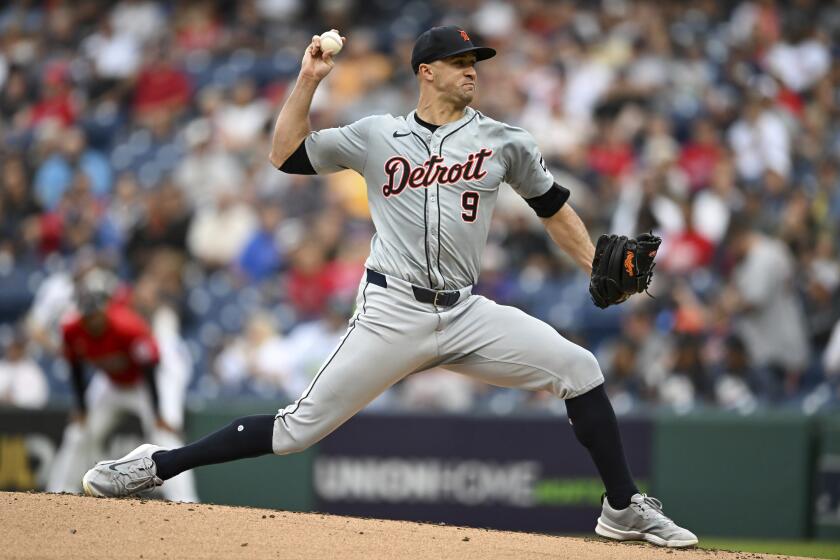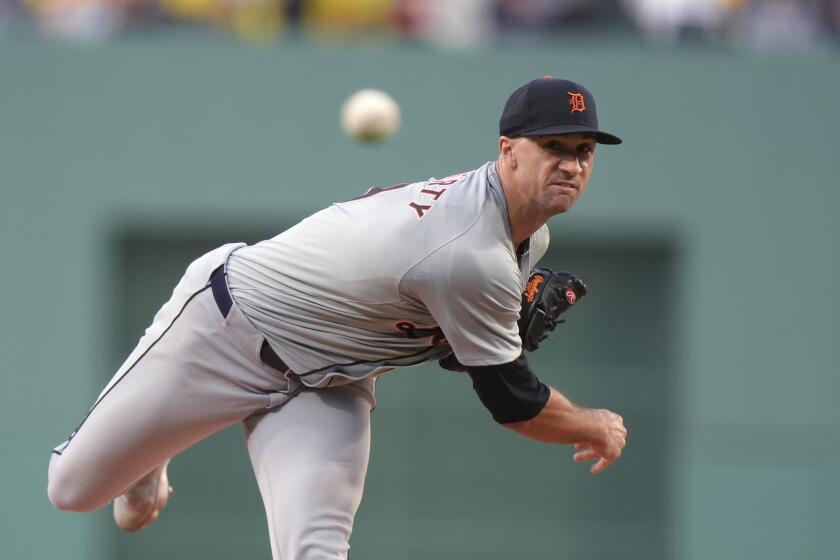Even with Jack Flaherty, the Dodgers still have significant problems

- Share via
SAN DIEGO — Home run?
That was more like a jam-shot single.
The Dodgers might not have struck out Tuesday, which was a very real possibility considering the market conditions. With limited options, they managed to improve their team.
But their most significant problems entering the trade deadline remain their most significant problems now.
Their rotation is still fragile, even after the acquisition of Jack Flaherty. Their situation at shortstop is still unsettled, even after the trade for Tommy Edman. Their lineup is still top-heavy, even after the addition of Amed Rosario.
The Dodgers raised their floor, in the sense that the reinforcements should prevent the bottom from falling out. But if their ceiling is any higher now, it’s only by a small increment.
For them to win the World Series, they will need a lot of things to go right — things that can happen but can’t be counted on to happen either.
President of baseball operations Andrew Friedman once famously said, “If you’re rational about every free agent, you will finish third on every free agent.”
The same applies to trades.
The one player who could have transformed the team’s outlook on his own was Detroit Tigers starting pitcher Tarik Skubal, who wasn’t available “in any scenario,” according to a person familiar with the Dodgers’ trade deadline discussions. The Tigers “wouldn’t talk about Skubal at all,” the person said.
The Dodgers, needing to shore up their starting rotation, add Jack Flaherty, a Harvard-Westlake product who went 7-5 with a 2.95 ERA this season with the Tigers.
In other words, the Dodgers didn’t even have the opportunity to be irrational.
Fair enough.
But the reason the Dodgers were backed into a corner was because of the chances on which they passed earlier in the year. Baseball’s trade season started earlier than usual this year, and the Dodgers were not participants.
They didn’t trade for Corbin Burnes, whom the Milwaukee Brewers sent instead to the Baltimore Orioles in February. They didn’t trade for Dylan Cease, whom the Chicago White Sox sent instead to the San Diego Padres in March.
They also didn’t sign Blake Snell, who was still a free agent when the Dodgers departed for their season-opening series in South Korea.
This isn’t just Monday morning quarterbacking.
As early as December, I was writing columns in which I wondered how the 5-foot-10 Yoshinobu Yamamoto would hold up to a 162-game schedule after pitching only once a week in Japan.
In the same columns, I was pointing out Tyler Glasnow’s troublesome medical history, specifically how Glasnow had never made more than 21 starts or pitched more than 120 innings.
“In short,” I wrote, “the Dodgers have invested more than $500 million on an undersized pitcher who has never stepped on a major league mound and a giant who has never stayed healthy.”
The remainder of the rotation was also made up of lottery tickets: prospects (Bobby Miller and Gavin Stone), pitchers returning from injuries (Walker Buehler and Clayton Kershaw) and reclamation projects (James Paxton).
The Dodgers made the move in the right direction in acquiring Jack Flaherty, a local kid who is experiencing a career rebirth, Bill Plaschke writes.
As for the rotation’s latest addition, the veteran right-hander Flaherty? He has been dealing with back problems over the last two years and the Athletic reported Tuesday that the New York Yankees withdrew from a preliminary trade agreement with the Tigers after reviewing his medical records.
The front office was equally, if not more, careless at shortstop. Instead of trading for an established shortstop such as Willy Adames of the Milwaukee Brewers, they entrusted the position to Gavin Lux, only to find out in spring training he couldn’t play it. Mookie Betts, who hadn’t played shortstop regularly since high school, became a stopgap. But after sitting out the last six weeks because of a broken hand, Betts could be asked to move back to either second base or right field — leaving the shortstop position in flux again.
The Dodgers are in a better place than they were last week. They added a measure of stability to their injury-ravaged rotation by acquiring Flaherty. They added infield depth with their trades of Edman and Rosario. They added a potential high-leverage reliever in the hard-throwing Michael Kopech.
But they simply had too many shortcomings to address in a single trade deadline. They have a realistic path to the World Series — they have Betts, Shohei Ohtani and Freddie Freeman, after all — but it’s a path that affords them minimal room for error.
More to Read
Are you a true-blue fan?
Get our Dodgers Dugout newsletter for insights, news and much more.
You may occasionally receive promotional content from the Los Angeles Times.










